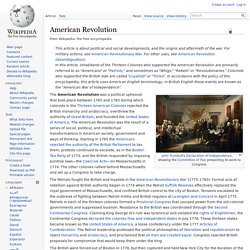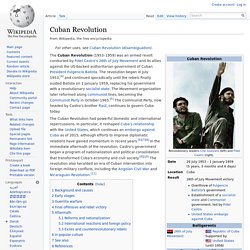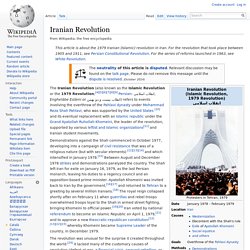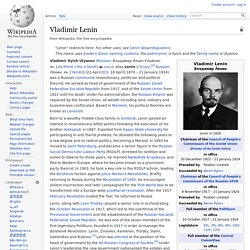

American Revolution. The American Revolution was a political upheaval that took place between 1765 and 1783 during which colonists in the Thirteen American Colonies rejected the British monarchy and aristocracy, overthrew the authority of Great Britain, and founded the United States of America.

The American Revolution was the result of a series of social, political, and intellectual transformations in American society, government and ways of thinking. Starting in 1765 the Americans rejected the authority of the British Parliament to tax them; protests continued to escalate, as in the Boston Tea Party of 1773, and the British responded by imposing punitive laws—the Coercive Acts—on Massachusetts in 1774. The other colonies rallied behind Massachusetts and set up a Congress to take charge. The Patriots fought the British and loyalists in the American Revolutionary War (1775–1783). Origins Background to 1763 The British began colonizing North America in the 17th century. 1764–1766: Taxes imposed and withdrawn.
Cuban Revolution. The Cuban Revolution (1953–1959) was an armed revolt conducted by Fidel Castro's 26th of July Movement and its allies against the US-backed authoritarian government of Cuban President Fulgencio Batista.

The revolution began in July 1953,[4] and continued sporadically until the rebels finally ousted Batista on 1 January 1959, replacing his government with a revolutionary socialist state. The Movement organization later reformed along communist lines, becoming the Communist Party in October 1965.[5] The Communist Party, now headed by Castro's brother Raúl, continues to govern Cuba today. The Cuban Revolution had powerful domestic and international repercussions.
Background and causes[edit] Early stages[edit] The people, including Fidel and Raúl Castro, were captured shortly afterwards. Soon, the Castro brothers joined with other exiles in Mexico to prepare for the overthrow of Batista, receiving training from Alberto Bayo, a leader of Republican forces in the Spanish Civil War.
Iranian Revolution. The Iranian Revolution (also known as the Islamic Revolution or the 1979 Revolution;[4][5][6][7][8][9] Persian: انقلاب اسلامی, Enghelābe Eslāmi or انقلاب بیست و دو بهمن) refers to events involving the overthrow of the Pahlavi dynasty under Mohammad Reza Shah Pahlavi, who was supported by the United States [10] and its eventual replacement with an Islamic republic under the Grand Ayatollah Ruhollah Khomeini, the leader of the revolution, supported by various leftist and Islamic organizations[11] and Iranian student movements.

Demonstrations against the Shah commenced in October 1977, developing into a campaign of civil resistance that was of a religious nature (but with secular elements) [12][13][14] and which intensified in January 1978.[15] Between August and December 1978 strikes and demonstrations paralyzed the country. The Shah left Iran for exile on January 16, 1979, as the last Persian monarch, leaving his duties to a regency council and an opposition-based prime minister. [edit] Vladimir Lenin. Vladimir Ilyich Ulyanov (Russian: Влади́мир Ильи́ч Улья́нов; IPA: [vlɐˈdʲimʲɪr ɪˈlʲitɕ ʊˈlʲanəf]), alias Lenin (/ˈlɛnɪn/;[2] Russian: Ле́нин; IPA: [ˈlʲenʲɪn]) (22 April [O.S. 10 April] 1870 – 21 January 1924) was a Russian communist revolutionary, politician and political theorist.

He served as head of government of the Russian Soviet Federative Socialist Republic from 1917, and of the Soviet Union from 1922 until his death. Under his administration, the Russian Empire was replaced by the Soviet Union; all wealth including land, industry and business was confiscated. Based in Marxism, his political theories are known as Leninism. Lenin, along with Leon Trotsky, played a senior role in orchestrating the October Revolution in 1917, which led to the overthrow of the Provisional Government and the establishment of the Russian Socialist Federative Soviet Republic. Early life Childhood: 1870–87 University and political radicalism: 1887–93 Revolutionary activities The 1905 Revolution: 1905–07.